裕兴新概念英语第二册笔记 第18课
- 格式:doc
- 大小:55.50 KB
- 文档页数:7
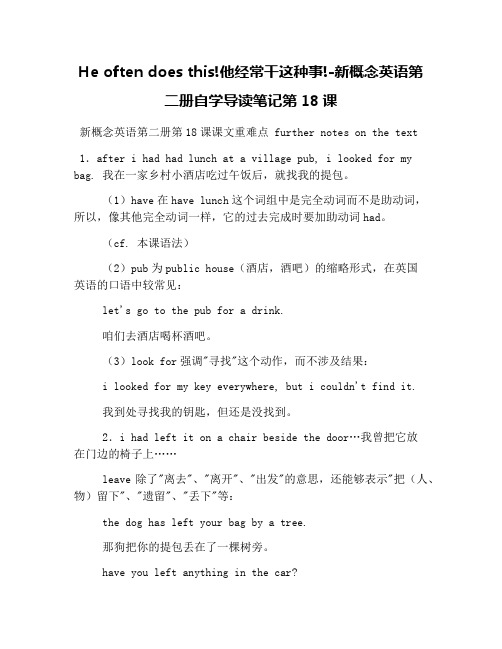
He often does this!他经常干这种事!-新概念英语第二册自学导读笔记第18课新概念英语第二册第18课课文重难点 further notes on the text1.after i had had lunch at a village pub, i looked for my bag. 我在一家乡村小酒店吃过午饭后,就找我的提包。
(1)have在have lunch这个词组中是完全动词而不是助动词,所以,像其他完全动词一样,它的过去完成时要加助动词had。
(cf. 本课语法)(2)pub为public house(酒店,酒吧)的缩略形式,在英国英语的口语中较常见:let's go to the pub for a drink.咱们去酒店喝杯酒吧。
(3)look for强调"寻找"这个动作,而不涉及结果:i looked for my key everywhere, but i couldn't find it.我到处寻找我的钥匙,但还是没找到。
2.i had left it on a chair beside the door…我曾把它放在门边的椅子上……leave除了"离去"、"离开"、"出发"的意思,还能够表示"把(人、物)留下"、"遗留"、"丢下"等:the dog has left your bag by a tree.那狗把你的提包丢在了一棵树旁。
have you left anything in the car?你有没有把什么东西丢在车里?leave the books on the desk.把书放在课桌上。
3.my dog had taken it into the garden. he often doesthis!我的狗把它弄到花园里去了,他常干这种事!he在这里指代的是狗。
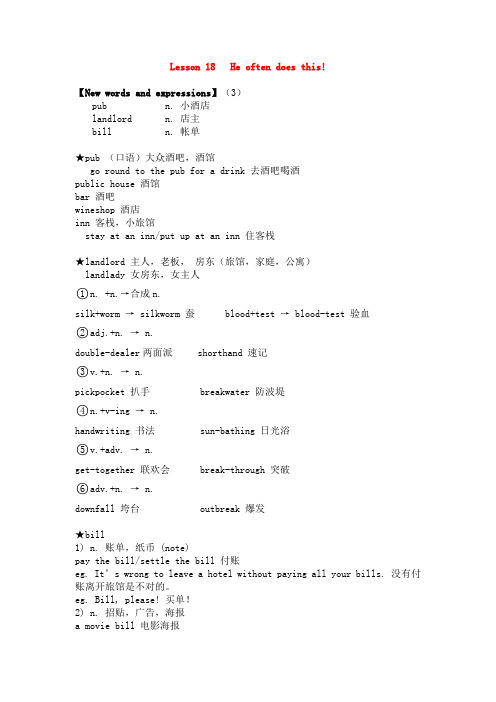
Lesson 18 He often does this!【New words and expressions】(3)pub n. 小酒店landlord n. 店主bill n. 帐单★pub (口语)大众酒吧,酒馆go round to the pub for a drink 去酒吧喝酒public house 酒馆bar 酒吧wineshop 酒店inn 客栈,小旅馆stay at an inn/put up at an inn 住客栈★landlord 主人,老板,房东(旅馆,家庭,公寓)landlady 女房东,女主人○1n. +n.→合成n.silk+worm → silkworm 蚕 blood+test → blood-test 验血○2adj.+n. → n.double-dealer两面派 shorthand 速记○3v.+n. → n.pickpocket 扒手 breakwater 防波堤○4n.+v-ing → n.handwriting 书法 sun-bathing 日光浴○5v.+adv. → n.get-together 联欢会 break-through 突破○6adv.+n. → n.downfall 垮台 outbreak 爆发★bill1) n. 账单,纸币 (note)pay the bill/settle the bill 付账eg. It’s wrong to leave a hotel without paying all your bills. 没有付账离开旅馆是不对的。
eg. Bill, please! 买单!2) n. 招贴,广告,海报a movie bill 电影海报eg. No bills! 禁止张贴!fit the bill/fill the bill 合乎要求head the bill/top the bill 领衔主演,挂头牌【Text】After I had had lunch at a village pub, I looked for my bag. I had left it on a chair beside the door and now it wasn't there! As I was looking for it, the landlord came in.'Did you have a good meal?" he asked.'Yes, thank you,' I answered, 'but I can't pay the bill. I haven't got my bag.'The landlord smiled and immediately went out. In a few minutes he returned with my bag and gave it back to me.'I'm very sorry,' he said. 'My dog had taken in into the garden. He often does this!'参考译文我在一家乡村小酒店吃过午饭后, 就找我的提包. 我曾把它放在门边的椅子上, 可这会儿不见了!当我正在寻找时, 酒店老板走了进来.“您吃得好吗?”他问.“很好, 谢谢. “我回答, “但我付不了帐, 我的提包没有了. “酒店老板笑了笑, 马上走了出去. 一会儿工夫他拿着我的提包回来了, 把它还给了我.“实在抱歉, “他说, “我的狗把它弄到花园里去了, 他常干这种事!”【课文讲解】1、After I had had lunch at a village pub, I looked for my bag.★Pub是public house(酒店,酒店)的缩写Let’s go to the pub for a drink.★look for 寻找(过程)eg. I am looking for my bag.look for a job 找工作find 找到(结果,不能用进行时态)eg. I found my brooch under the sofa. 我是在沙发下面找到胸针的。

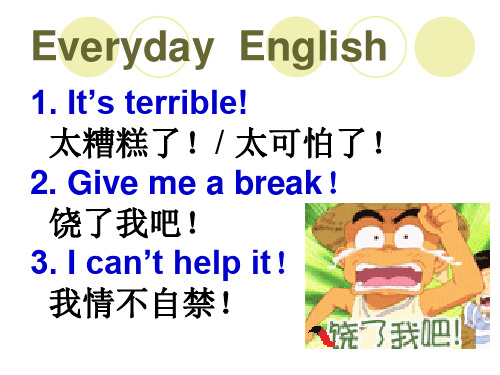
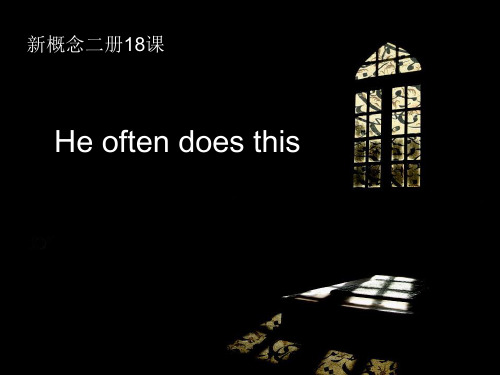
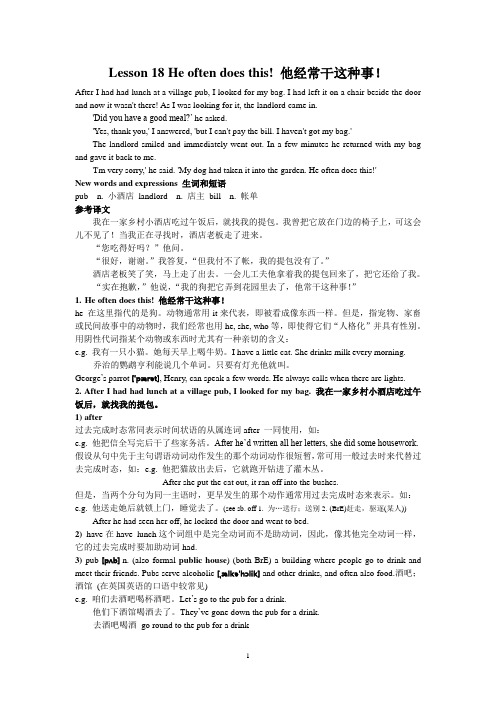
Lesson 18 He often does this! 他经常干这种事!After I had had lunch at a village pub, I looked for my bag. I had left it on a chair beside the door and now it wasn't there! As I was looking for it, the landlord came in.'Did you have a good meal?’ he asked.'Yes, thank you,' I answered, 'but I can't pay the bill. I haven't got my bag.'The landlord smiled and immediately went out. In a few minutes he returned with my bag and gave it back to me.'I'm very sorry,' he said. 'My dog had taken it into the garden. He often does this!'New words and expressions 生词和短语pub n. 小酒店landlord n. 店主bill n. 帐单参考译文我在一家乡村小酒店吃过午饭后,就找我的提包。
我曾把它放在门边的椅子上,可这会儿不见了!当我正在寻找时,酒店老板走了进来。
“您吃得好吗?”他问。
“很好,谢谢。
”我答复,“但我付不了帐,我的提包没有了。
”酒店老板笑了笑,马上走了出去。
一会儿工夫他拿着我的提包回来了,把它还给了我。
“实在抱歉,”他说,“我的狗把它弄到花园里去了,他常干这种事!”1.He often does this! 他经常干这种事!he 在这里指代的是狗。
新概念英语第二册课后习题答案详解Lesson 18 1. b根据课文第1-2行I had left it on a chair beside the door and not it wasn ’tthere, 只有b. had her bag with her when she went to the pub 与课文实际内容相符合,而其他3个都与课文内容不符。
2. d 根据课文最后两段可以推测,只有d. knew that the writer could pay her bill 符合课文的含义,这正是课文所暗示老板当时的心态,而其他3个选择都与课文内容不符。
个选择都与课文内容不符。
3. b 前一句中的had lunch 是“吃过午饭”的意思,只有是“吃过午饭”的意思,只有b. eaten(吃了)同它的意思相同,而其他3个选择a. paidfor(付钱) ,c. kept(保持保持),d. bought(买)都同had 意思不同,所以选b.是对的。
是对的。
4. d只有选 d. there ,才能使这一句话同前面的句子,才能使这一句话同前面的句子She couldn ’t find her bag 意思相符。
意思相符。
而其他3个选择a. their( adj. 他们的),确b. theirs(他们的他们的), c. they’re(他们是)都不符合题目意思和语法。
5. b 只有选一个引导时间状语从句的连词才能使这个句子通顺并符合逻辑。
a. Because(因为)种种原因是引导原因状语从句的;c. But(但是)是表示转折的;d.even if (虽然)是引导让步状语的。
这3个选择都不符合题目意思。
不符合题目意思。
只有b. While 是引导时间从句的,因此只有选b. 6. c 只有 c. own(拥有拥有)同前一句中的have got 意思相同。
意思相同。
a. get (得到,获得);b. buy(买);d. owe(欠,欠,负债);这3个选择都与have got 意思不符合;因此c. own 是正确的答案。
Lesson 18 He often does this他经常干这种事!What had happened to the writer's bag?After I had had lunch at a village pub, I looked for my bag. I had left it on a chair beside the door and now it wasn't there! As I was looking for it, the landlord came in.'Did you have a good meal?" he asked.'Yes, thank you,' I answered, 'but I can't pay the bill. I haven't got my bag.'The landlord smiled and immediately went out. In a few minutes he returned with my bag and gave it back to me.'I'm very sorry,' he said. 'My dog had taken in into the garden. He often does this!'参考译文我在一家乡村小酒店吃过午饭后,就找我的提包。
我曾把它放在门边的椅子上,可这会儿不见了!当我正在寻找时,酒店老板走了进来。
“您吃得好吗?”他问。
“很好,谢谢。
”我回答,“但我付不了帐,我的提包没有了。
”酒店老板笑了笑,马上走了出去。
一会儿工夫他拿着我的提包回来了,把它还给了我。
“实在抱歉,”他说,“我的狗把它弄到花园里去了,他常干这种事!”【New words and expressions】(3)pub(口语)大众酒吧,酒馆go round to the pub for a drink 去酒吧喝酒pub-crawl 在数家酒馆连续喝酒public house 酒馆bar 酒吧wineshop 酒店inn 客栈,小旅馆stay at an inn/put up at an inn 住客栈landlord主人,老板,房东(旅馆,家庭,公寓)landlady 女房东,女主人n. +n.→合成n.silk+worm → silkworm 蚕blood+test → blood-test 验血adj.+n. → n.double-dealer两面派shorthand 速记v.+n. → n.pickpocket 扒手breakwater 防波堤n.+v-ing → n.handwriting 书法sun-bathing 日光浴v.+adv. → n.get-together 联欢会break-through 突破adv.+n. → n.downfall 垮台outbreak 爆发lordas drunk as a lord 酩酊大醉eg. Lord! 天啊!哎呀!哎哟!lord n. 贵族,勋爵duke [dju:k] 公爵marquis ['mɑ:kwɪs, mɑ:'ki:] 侯爵earl [ɜ:l] 伯爵viscount ['vaɪ,kaʊnt] 子爵baron ['bærən] 男爵sir 爵士ladyeg. Lady first. 女士优先。
Ladies and gentlemen 先生们,女士们(称呼套话)Ladies 女厕所bill1) n. 账单,纸币(note)pay the bill/settle the bill 付账eg. It’s wrong to leave a hotel without paying all your bills. 没有付账离开旅馆是不对的。
eg. Bill, please! 买单!2) n. 招贴,广告,海报a movie bill 电影海报eg. No bills! 禁止张贴!fit the bill/fill the bill 合乎要求head the bill/top the bill 领衔主演,挂头牌have的用法:l、现在完成时have/has + V. -ed1)表示过去某时发生的某一动作对现在造成的影响或结果。
2)表示动作从过去已经开始,持续到现在,并且还可能继续下去的动作或状态。
2、过去完成时:had + V. -ed1)表示在过去某一时刻或动作以前已经完成了的动作,即“过去的过去”2)表示由过去的某一时刻开始,一直延续到过去另一时刻的动作或状态。
例:Have you had lunch yet? 你吃过午饭了么?He and I have known each other for a long time.他和我已经认识很久了。
After he had finished work he went home他完成工作后回家了。
We had been waitiing for an hour when he showed up.他出现时,我们己经等了一个小时了。
2. have拥有(相当于own,possess)eg: He owns/has/possesses /has got a house.他有一栋房子。
Does/Has he possess a lot of money? 他有很多钱么?Has he got a lot of money?3. have替换其他动词take/have a bath洗澡take/have a biscuit 吃饼干enjoy oneself= have a good time 度过...receive/have a letter 收到一封信有关have的常见含义1)吃have lunch吃午饭2)喝、吸have a cup of coffee喝一杯咖啡3)患(得)病have a fever发烧have a headache头疼4)有(家人,朋友)Do you have any brothers or sisters?你有兄弟姐妹么?5)拥有(想法),持有What opinion do you have?你有什么看法?4. have不得不做某事)have to do sthI have to finish this paper. 我不得不完成这份文件。
2)have sb do sthHave sth done练习:用have的正确形式填空1. After I ___lunch at the village pub, I looked for my bag. 我吃完饭后找我的包。
答案:had had2. I____ left it on a chair beside the door.我曾把他放在门旁边的椅子上。
答案:had3. '_____ a good meal?’he asked他问:你吃的好么?答案:Did you have4. I can' t pay the bill. I ____got my bag.我没法付账了,我包没了。
答案:have not5. I'm very sorry. My dog = taken it into the garden.我很抱歉,我的狗吧它带到花园里去了。
答案:had总结:have sth have got sth拥有...下面哪句话可以用have got来代替have。
l. He had a drink before dinner.他吃饭前喝了点东西——不可以替换。
2. Mrs. Sullivan has a lot of money.苏利文太太有很多钱。
——可以替换has got3. He had to leave early.他不得不早点走。
一一可以替换had got to4. We have had a long conversation.我们交谈了很长时间。
——不可以替换5. My mother has a headache. 我妈妈头疼。
——不可以替换6. They had a good time at the party.他们在舞会上玩的很高兴。
——不可以替换总结:当have sth或have got sth表示“拥有”时可以替换;当have to do sth或have got to do sth表不“不得不做”时可以替换。
After I had had lunch at a village pub, I looked for my bag. I had left it on a chair beside the door and now it wasn't there!look for 寻找(过程)eg. I am looking for my bag.look for a job 找工作find 找到(结果,不能用进行时态)eg. I found my brooch under the sofa. 我是在沙发下面找到胸针的。
find out 发现,找出,搜出(结果)eg. You should find out (the answer) for yourself. 你应该自己找出答案来。
find 发现(有偶然之意)eg. When he woke up, he found himself in hospital. 当他醒来时,发现自己躺在医院里。
leave---left---left1) v. 把(人/物)留下,遗留,丢下eg. My I leave my shoes here? 我能把鞋放在这儿吗?2) v. 听任…,使…处于某种状态leave sth + adj.eg. Don’t lea ve the door open. 别把门开着。
eg. Better leave it unsaid. 话还是不讲出来的好。
eg. Leave them as they are. 让它们保持原样。
3) v. 离开leave some place 离开某个地方leave for some place 离开去某地eg. Leave England for a tour of the world. 离开英国去环球旅游。
4) on leave 休假中beside 在…旁边eg. Come and sit beside me. 过来坐到我旁边。
besides 除…之外,还有eg. Besides this photograph, I have a number of others.除了这张照片外,我还有很多其它的照片。